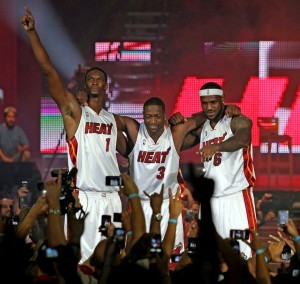By Josh Martin, Sports Editor

With the talent in professional sports leagues these days, it seems to be that the new way for teams to be successful is if players give in to taking pay cuts to their salary under contract. This way, the top players all re-sign onto the same team for less money than they are valued at so the team can afford them under their respected salary caps. The most notable example of this is with the Miami Heat basketball team in the NBA.
In the summer of 2010, NBA superstar LeBron James decided to not re-sign with the Cleveland Cavaliers—the team who drafted him first overall in the 2003 NBA draft—and head down to Miami to join fellow NBA stars, Dwyane Wade and newly acquired Chris Bosh in the hopes of winning a championship. All three players agreed to take less money than what they were valued at in order to have a legitimate shot at being a number one team in the league. The ‘big three’ were now the main core for the Miami Heat, All-Star players playing on the same team. And it paid off, as they took home the 2012 NBA championship last season.
This past off-season, the Miami Heat drew in another All-Star to their team—Ray Allen from the Boston Celtics. He reportedly signed a $3.09-million contract that could be worth a maximum of $9.5 million over three years. The catch here is the fact that he was offered a two-year $12-million contract by the Celtics and was hoping on landing a three-year $27-million contract in the free agent market. So, why does he sign for less than triple the price he was seeking for? It’s simple; if the Heat won with the All-Star cast that they had last season, then they are more than capable of doing it again in the next year along with the addition of point guard specialist—Mr. Allen. He is almost guaranteed a championship by playing for the Heat.
A similar situation was made public in the NHL with Alex Burrows of the Vancouver Canucks a few seasons ago. He made it clear by taking a pay cut with the Canucks and saying that other players on the team should do the same if they want to win a Stanley Cup. The Sedins are both under contract with affordable prices to their market value at twin $6.1 millions per year. However the commitment hasn’t really paid off for the Canucks. Not enough All-Star players are enticed enough to come to Vancouver, let alone for a cheaper market price. How does a team arrange for this to happen?
Heat president Pat Riley should be applauded for what he’s done with Miami, bringing in all of these star players for a cheaper market value. They are nearly unstoppable with the latest addition of Allen to the team. It seems like the only way to take the Heat down is if another team plays the same card as Riley and brings in their own All-Stars in order to be of any competition.